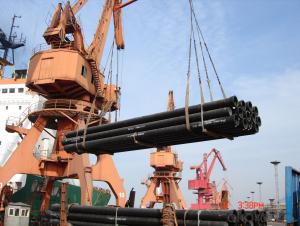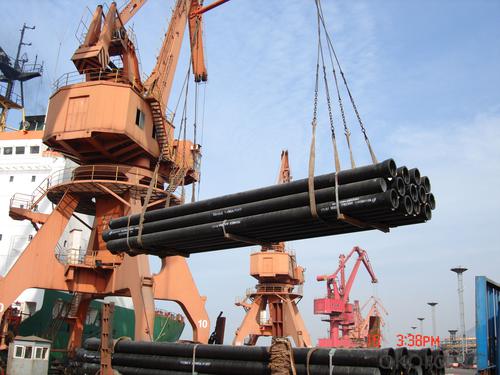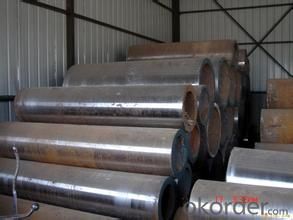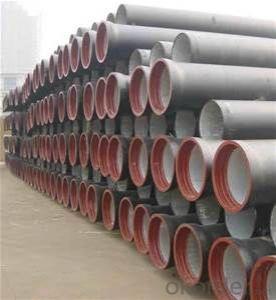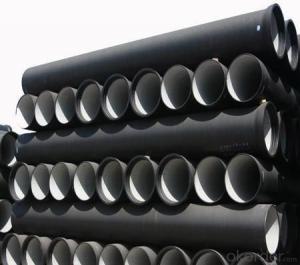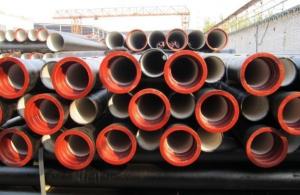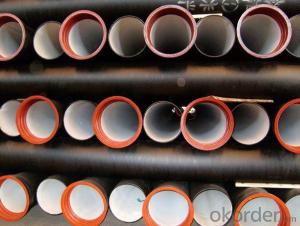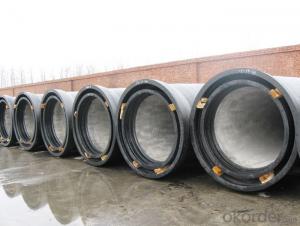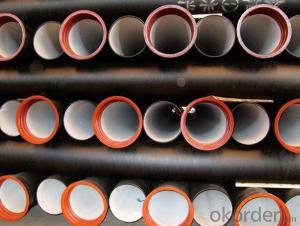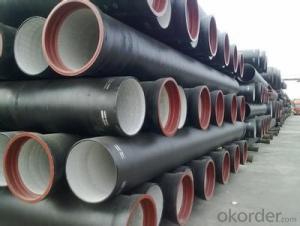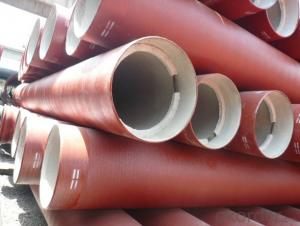Ductile Iron Pipe ISO2531 / EN545 / EN598 DN300
- Loading Port:
- China main port
- Payment Terms:
- TT OR LC
- Min Order Qty:
- 25 m.t.
- Supply Capability:
- 100000 m.t./month
OKorder Service Pledge
OKorder Financial Service
You Might Also Like
1.Ductile Iron Pipe Description :
1) Pipes confirm to ISO2531,K9 class,T type joint,6m long,with inside cements lining conform to ISO4179, outside Zinc spraying(130g/m2) and bitumen coating(70μm) conform to ISO8179.
2) Pipe ends: Spigot and socket ends, with 100% SBR rubber gaskets accoding to ISO4633
3) we can do third party inspection according to customer's request.
4) Our products have been sold to many international market, such as Middle East and South East Asia and Africa.
2.Main Features of the Ductile Iron Pipe:
1).Quality guarantee
• Chemical checking
• NDE after rough machining
• Mechanical testing after heat treatment
• Final NDE,dimension inspected
2).Quality document
• Full Q.A document as per client request
3).Service
• Drawing: we can translate your original drawing, offer best suggestion on design
• Quality: we have full set quality control system to guarantee the best quality.
• Inspection: inspect in house, all our products must be checked 3 times before packing
4)Inspection
• In-house Foundry
• Third party inspection available upon requirement
3.Ductile Iron Pipe Images:
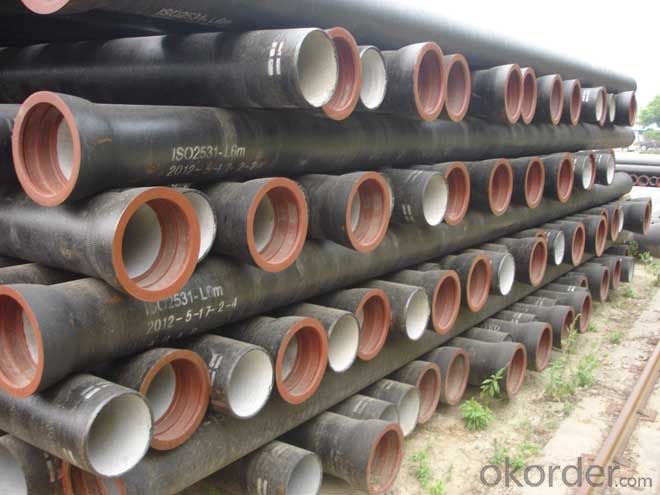
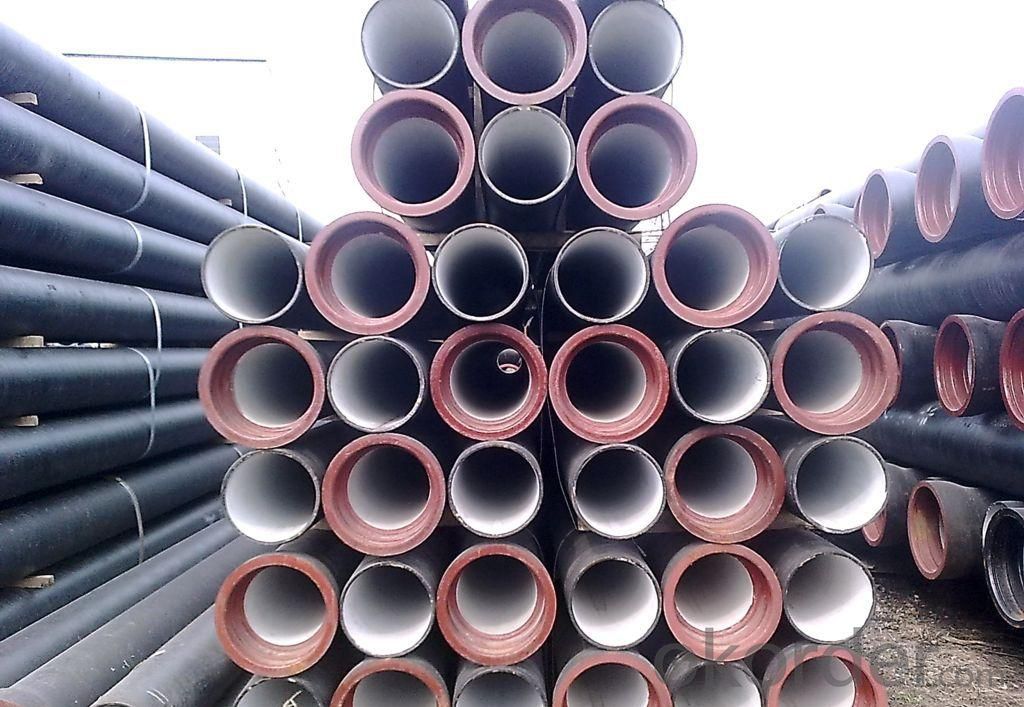
4.Ductile Iron Pipe Specification:
Place of Origin: China (Mainland)
Model Number: DN80-1600
Length: 6M/5.7M/NEGOTIATED
Standard: ISO2531 / EN545
Application: Potable/Sewage Water
Diameter: DN80-1600
Hardness: 230
Pipe Wall Thickness: standerd
Pull Strength: 420
Yield (≥ MPa): 300
Material: Ductile Iron
5.FAQ:
1.Q: Why would you choose ductile iron pipe rather than other pipe materials?
A:The reasons are obvious for that not only ductile iron pipe possesses the inherent strength and flexibility of ductile iron, combined with proven corrosion protection systems, but also the cost savings can be achieved from design to installation and commissioning.
2.Q:Why can you guarantee the inner of pipes can’t be corroded?
A: High alumina cement mortar lining and sulphate-resistant cement mortar lining. These two special linings are applicable to inner anti-corrosion for sewage pipes, improving resistance to erosion of the sewage components.
- Q: What are the specifications of cast iron pipes?
- To be divided into: cast cast pipe. Cast iron pipes are used for water supply, drainage and gas transmission lines. They include cast iron pipes and pipe fittings. Labor intensity is small. According to the casting method, it is divided into continuous cast iron pipe and centrifugal cast iron pipe, in which the centrifugal cast iron pipe is divided into sand mould and metal type two kinds. Divided into gray cast iron pipe and nodular cast iron pipe according to different material. Rubber ring seals for flexible interfaces,
- Q: Are ductile iron pipes suitable for bridge crossings or crossings under roadways?
- Yes, ductile iron pipes are suitable for bridge crossings or crossings under roadways. They possess high strength and durability, making them capable of withstanding heavy loads and traffic conditions. Additionally, their flexibility and resistance to external pressures make them an ideal choice for such applications, ensuring long-lasting and reliable performance.
- Q: How can 4 inch ductile iron pipe be connected with 2 inch galvanized pipe?
- Ductile cast iron used for more than 18 by adding nodulizer, after centrifugal ductile cast iron machine high speed centrifugal cast pipe, called "ductile" (Ductile Cast Iron Pipes), referred to as ball pipe, ductile iron pipe and ductile iron pipe etc.. The utility model is mainly used for conveying water, and is an ideal choice for tap water pipes.
- Q: Are ductile iron pipes suitable for use in mining applications?
- Yes, ductile iron pipes are suitable for use in mining applications. They possess excellent strength, durability, and resistance to corrosion, making them ideal for transporting fluids and materials in the harsh and demanding conditions of mining operations. Additionally, their ductility enables them to withstand high pressures and impacts, ensuring reliable performance and long service life in mining environments.
- Q: Can ductile iron pipes be used in areas with high soil settlement?
- Yes, ductile iron pipes can be used in areas with high soil settlement. Ductile iron pipes are known for their strength and durability, which makes them suitable for various soil conditions, including areas with high soil settlement. These pipes have the ability to withstand external loads and ground movement, making them an ideal choice for such areas. Additionally, ductile iron pipes have a high resistance to corrosion, which further enhances their suitability for use in areas with high soil settlement. However, it is important to consider factors such as proper installation techniques, appropriate bedding and backfill materials, and regular maintenance to ensure the longevity and performance of the ductile iron pipes in areas with high soil settlement. Consulting with a qualified engineer or pipe manufacturer can provide more specific guidance based on the site's conditions and requirements.
- Q: How do ductile iron pipes handle ground movement in earthquake-prone areas?
- Ductile iron pipes are designed to withstand ground movement in earthquake-prone areas due to their inherent strength and flexibility. The ductile nature of the iron allows the pipes to deform and absorb the seismic energy without breaking or fracturing. This ensures their durability and ability to maintain water supply and drainage systems even during seismic events. Additionally, ductile iron pipes have superior joint integrity, which further enhances their resistance to ground movement and minimizes the risk of leaks or pipe failure.
- Q: How is ductile iron pipe tested for quality?
- Extensive quality testing is carried out on ductile iron pipe to ensure its performance and reliability in various applications. The pipe undergoes a series of steps to assess its physical and mechanical properties. The hydrostatic pressure test is one of the main tests performed on ductile iron pipe. This test involves subjecting the pipe to fluid pressure that exceeds its designed operating pressure. The purpose is to determine if the pipe can withstand internal pressure without any leakage or failure. The pipe is filled with water or another suitable fluid, and the pressure is gradually increased to the required level. During this test, the pipe is carefully inspected for any signs of leakage or deformation. Another essential test is the tensile strength test, which measures the pipe's ability to resist pulling or stretching forces. A sample of the pipe is pulled until it breaks, and the maximum force applied during the test is recorded. This test helps determine important properties such as the pipe's ultimate tensile strength, yield strength, and elongation. The Charpy test is used to assess the pipe's impact resistance. In this test, a notched sample is struck with a swinging pendulum to measure the amount of energy absorbed by the pipe. It helps determine if the pipe can withstand sudden impacts or loads without fracturing. In addition to these tests, the pipe also undergoes various non-destructive tests, including ultrasonic testing, magnetic particle inspection, and visual inspection. These tests are crucial in detecting any internal or external defects, cracks, or abnormalities that could compromise the pipe's structural integrity. Furthermore, chemical analysis and metallographic examination are performed to evaluate the chemical composition and microstructure of the ductile iron pipe. These tests ensure that the pipe meets the necessary specifications and standards for its intended application. Overall, the testing process for ductile iron pipe is thorough and stringent. Its purpose is to guarantee the pipe's quality, durability, and overall performance in safely and efficiently delivering water, wastewater, or other fluids.
- Q: Can ductile iron pipe be used for oil and gas pipelines?
- Yes, ductile iron pipe can be used for oil and gas pipelines. Its high strength, durability, and corrosion resistance make it suitable for transporting oil and gas over long distances. Additionally, its flexibility and ability to withstand high pressures and temperatures make it a reliable choice for such applications.
- Q: How does ductile iron pipe perform in areas with high soil corrosivity?
- Due to its inherent corrosion-resistant properties, ductile iron pipe exhibits exceptional performance in areas with high soil corrosivity. The material specifically utilized in ductile iron pipes is engineered to endure harsh soil conditions, including those with elevated levels of corrosive elements. The protective coating is one of the key factors making ductile iron pipe suitable for areas with high soil corrosivity. Most ductile iron pipes are coated with either a layer of cement mortar or a polyethylene sleeve, which acts as a barrier separating the soil from the pipe. This coating serves the dual purpose of preventing direct contact between the soil and the iron, as well as providing an additional layer of defense against corrosion. Moreover, ductile iron possesses inherent corrosion resistance. It contains a higher carbon percentage compared to traditional cast iron, enhancing its strength and durability. The carbon content also generates a protective layer of graphite within the iron matrix, acting as a natural barrier against corrosion. Ductile iron pipes have demonstrated a long service life in areas with high soil corrosivity, often surpassing 100 years. This is due to their ability to withstand corrosion and maintain structural integrity even in harsh environments. Additionally, ductile iron pipes exhibit high resistance to external loads and can endure the stresses associated with high soil corrosivity. In summary, ductile iron pipe is an exceptional choice for areas with high soil corrosivity. Its corrosion-resistant properties, coupled with protective coatings, guarantee the pipe's durability and reliability, even under the most challenging soil conditions.
- Q: How can the ductile iron pipe be welded?
- Welding cast iron is mainly in three aspects: carbon control, stress elimination, structural adjustment. You can choose better welding materials, such as WE777 and other imported welding materials. Crack resistance is very good. In addition, the sewing process can be adopted in the structure to increase the stability of the welding effect. You can learn more about WE777 welding applications.
Send your message to us
Ductile Iron Pipe ISO2531 / EN545 / EN598 DN300
- Loading Port:
- China main port
- Payment Terms:
- TT OR LC
- Min Order Qty:
- 25 m.t.
- Supply Capability:
- 100000 m.t./month
OKorder Service Pledge
OKorder Financial Service
Similar products
Hot products
Hot Searches
Related keywords
